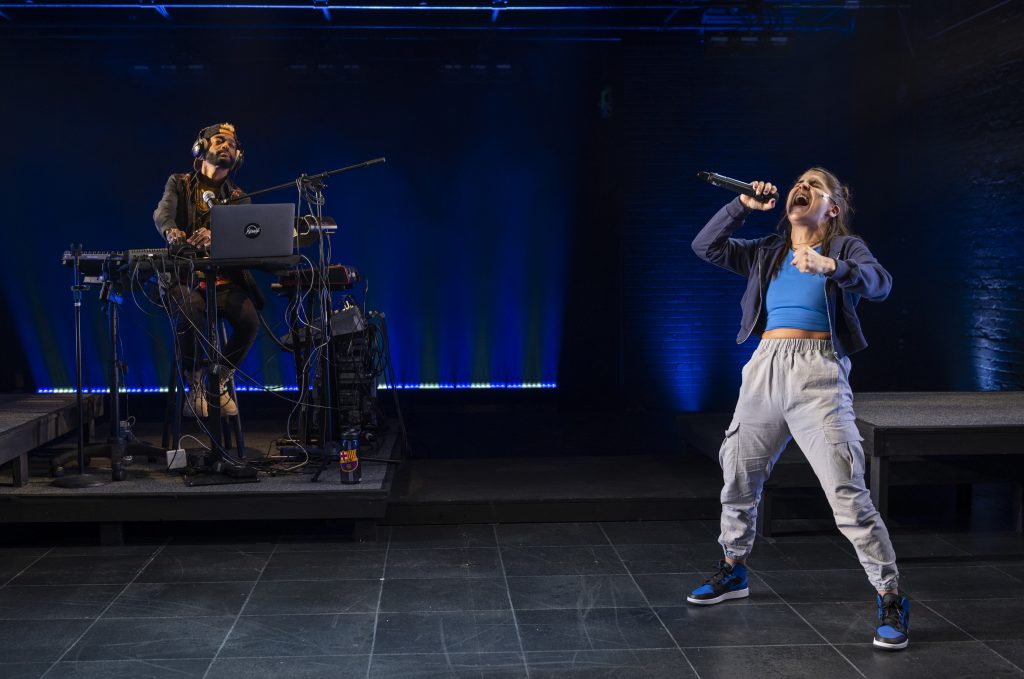“Where Did We Sit On The Bus?” Aims To Address Segregation
But Milwaukee Chamber Theatre stumbles into banalities.
If only the best-meaning theater was also good theater. But the Milwaukee Chamber Theatre – one of the most talented groups in the community – has come a cropper opening its season this October.
Originally intended for last year as the program explains – suggesting there was time to see the problems – it wanted to expand (as the program also says) “its spectrum of identities and lived experiences as part of a larger effort to dismantle the segregation” that has long divided our community and indeed the country.
It’s a still-provocative question for millions who felt and may still feel invisible and unwelcome, but it’s not a particularly fresh revelation in the current crop of movies and plays that Brown skin people feel left out of the history pageant while they should be central to our discussion.
Brian Quijada’s play is really a disguised monolog with rapper-like poetry about growing up in an immigrant family. The staging adds original music and stage presence from a Black DJ with Milwaukee roots and following — Kellen (Klassik) Abston — but relies on an energetic charismatic Chicago-based actress, Isa Arciniegas, doing the heavy 90-minute lifting as the boy who grows into manhood (she seems a lot like playwright Quijada).
The studio stage is bare and black except for platforms and sound equipment. Arciniegas occasionally interacts with the DJ but the monologue falls heavily on her with occasional songs as a break from the synthesizer shimmies. Klassik is rather entertaining to watch in his rocking motion, but the musical underlay becomes maddeningly repetitious, then stops abruptly when the playwright wants his words to dominate.
Arciniega is left hanging out there with a rapid-fire mixture of Spanish and English, broken up thankfully by her enthusiastic dance moves. Toward the end we get some direct speeches and the real purpose behind the meandering tale – powerful elaborations of the Latino immigrants’ plight, a declamatory lecture that should put Trumpsters to shame, except there are so many better artistic ways to expose them.
Someday, Quijada may tell this important story in a more important way.
Dominique Paul Noth served for decades as film and drama critic, later senior editor for features at the Milwaukee Journal. You’ll find his blog here and here.
Review
-
Eating Burmese in Bay View
 Dec 13th, 2025 by Cari Taylor-Carlson
Dec 13th, 2025 by Cari Taylor-Carlson
-
Casablanca Is a Milwaukee Success
 Nov 30th, 2025 by Cari Taylor-Carlson
Nov 30th, 2025 by Cari Taylor-Carlson
-
Oh, Those Witty 18th Century Brits
 Nov 24th, 2025 by Dominique Paul Noth
Nov 24th, 2025 by Dominique Paul Noth
Theater
-
Oh, Those Witty 18th Century Brits
 Nov 24th, 2025 by Dominique Paul Noth
Nov 24th, 2025 by Dominique Paul Noth
-
Skylight’s Holiday Show Is Lots of Fun
 Nov 16th, 2025 by Dominique Paul Noth
Nov 16th, 2025 by Dominique Paul Noth
-
Rep’s ‘Come From Away’ Is a Triumph
 Nov 10th, 2025 by Dominique Paul Noth
Nov 10th, 2025 by Dominique Paul Noth





















